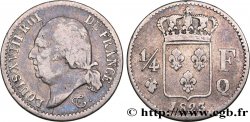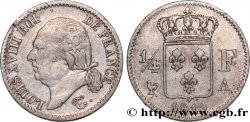E-auction 598-565205 - fme_932505 - LOUIS XVIII Médaille, Mort de Charles Ferdinand duc de Berry
You must signin and be an approved bidder to bid, LOGIN TO BID. Accounts are subject to approval and the approval process takes place within 48 hours. Do not wait until the day a sale closes to register. Clicking on « bid » constitutes acceptance of the terms of use of cgb.fr private e-auctions.
Bids must be placed in whole Euro amounts only. The sale will start closing at the time stated on the item description; any bids received at the site after the closing time will not be executed. Transmission times may vary and bids could be rejected if you wait until the last second. For further information ckeck the E-auctions F.A.Q.
NO BUYER'S FEE.
NO BUYER'S FEE.
| Estimate : | 1 € |
| Price : | 31 € |
| Maximum bid : | 31 € |
| End of the sale : | 30 September 2024 20:59:00 |
| bidders : | 7 bidders |
Type : Médaille, Mort de Charles Ferdinand duc de Berry
Date: 1820
Metal : copper
Diameter : 41 mm
Orientation dies : 12 h.
Engraver GAYRARD Raymond (1777-1858) / DE PUYMAURIN Jean-Pierre (1757-1841)
Weight : 38,07 g.
Edge : lisse
Puncheon : sans poinçon
Coments on the condition:
Médaille nettoyée. Présence de traces d’usure, coups et rayures
Catalogue references :
Obverse
Obverse legend : CH. FERDINAND - DUC DE BERRY.
Obverse description : Buste à gauche du Duc de Berry; signé : GAYRARD F..
Reverse
Reverse legend : PUGIONE / PERCUSSUS PERIIT / 14 FEB. 1820 / - / GALLIA SPEM SUAM / CONJUX AMANTEM / MILITES DUCEM / PAUPERES PATREM / PERDIDERE.
Reverse description : Inscription en 8 lignes dans le champ, cerné de deux rameaux; signé : DE PUYMAURIN FECIT ET DIR..
Commentary
Médaille conservée dans un écrin vert rond
Le duc de Berry, neveu du roi Louis XVIII et héritier potentiel au trône de France est assassiné dans la nuit du 13 au 14 février 1820 sur la place Louvois par l'ouvrier bonapartiste Louvel.
L'assassinat a un fort retentissement dans le pays car c'est sur le duc de Berry que l'avenir de la dynastie bourbonienne reposait. C'est pourquoi cet assassinat est perçu comme un régicide par l'opinion. Les ultras-royalistes se déchaînent alors face à Decazes, considéré comme le principal responsable de cette situation avec sa politique libérale.
Louvel est guillotiné le 7 juin 1820 sur la place de Grêve. Le 29 septembre 1820, un enfant naît de Marie-Caroline des Deux-Siciles, la femme du défunt duc. La dynastie est alors sauvée et le nouveau-né est appelé Henri Dieudonné d'Artois.
Medal preserved in a round green case The Duke of Berry, nephew of King Louis XVIII and potential heir to the throne of France, was assassinated on the night of February 13 to 14, 1820, in Place Louvois by the Bonapartist worker Louvel. The assassination had a strong impact on the country because the future of the Bourbon dynasty rested on the Duke of Berry. This is why this assassination was perceived as a regicide by public opinion. The ultra-royalists then went on a rampage against Decazes, considered the main culprit in this situation with his liberal policies. Louvel was guillotined on June 7, 1820, in Place de Grêve. On September 29, 1820, a child was born to Marie-Caroline of the Two Sicilies, the wife of the late Duke. The dynasty was then saved and the newborn was named Henri Dieudonné d'Artois.
Le duc de Berry, neveu du roi Louis XVIII et héritier potentiel au trône de France est assassiné dans la nuit du 13 au 14 février 1820 sur la place Louvois par l'ouvrier bonapartiste Louvel.
L'assassinat a un fort retentissement dans le pays car c'est sur le duc de Berry que l'avenir de la dynastie bourbonienne reposait. C'est pourquoi cet assassinat est perçu comme un régicide par l'opinion. Les ultras-royalistes se déchaînent alors face à Decazes, considéré comme le principal responsable de cette situation avec sa politique libérale.
Louvel est guillotiné le 7 juin 1820 sur la place de Grêve. Le 29 septembre 1820, un enfant naît de Marie-Caroline des Deux-Siciles, la femme du défunt duc. La dynastie est alors sauvée et le nouveau-né est appelé Henri Dieudonné d'Artois.
Medal preserved in a round green case The Duke of Berry, nephew of King Louis XVIII and potential heir to the throne of France, was assassinated on the night of February 13 to 14, 1820, in Place Louvois by the Bonapartist worker Louvel. The assassination had a strong impact on the country because the future of the Bourbon dynasty rested on the Duke of Berry. This is why this assassination was perceived as a regicide by public opinion. The ultra-royalists then went on a rampage against Decazes, considered the main culprit in this situation with his liberal policies. Louvel was guillotined on June 7, 1820, in Place de Grêve. On September 29, 1820, a child was born to Marie-Caroline of the Two Sicilies, the wife of the late Duke. The dynasty was then saved and the newborn was named Henri Dieudonné d'Artois.








 Report a mistake
Report a mistake Print the page
Print the page Share my selection
Share my selection Ask a question
Ask a question Consign / sell
Consign / sell
 Full data
Full data









